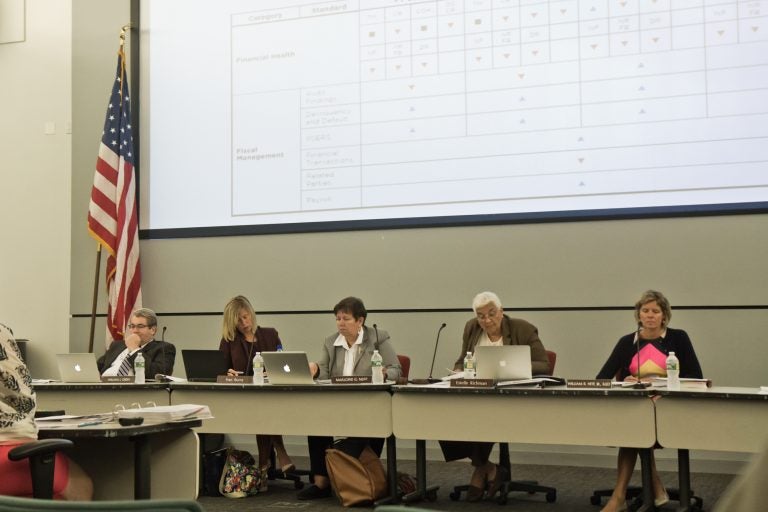Philly SRC departs with busy meeting
The SRC also left some business on the table, failing to reach agreements with 25 charter schools that say the commission’s terms are too restrictive.

The School Reform Commission met for the last time on Thursday. (Kimberly Paynter/WHYY)
Philadelphia’s School Reform Commission held what were likely its last set of meetings Thursday, packing a flurry of important decisions into its final public gathering.
The SRC renewed or approved more than a dozen charter schools; voted against renewal for one other; and barred suspensions for first- and second-graders, except in cases when they cause bodily injury.
The SRC also left some business on the table, failing to reach agreements with 25 charter schools that say the commission’s terms are too restrictive. When the Philadelphia’s new Board of Education takes control next month, roughly a quarter of the schools in the city’s growing charter sector will be without mutually acceptable, valid agreements.
It’s been nearly 17 years since the SRC first convened, kicking off an experiment in state control over Pennsylvania’s largest school district. With three of the commission’s five members selected by the governor and approved by the state Senate, Harrisburg enjoyed unprecedented say in district affairs. Under the SRC, charter schools expanded and graduation rates improved.
But the district was dogged by financial troubles; activists resented the reduced local power in major school decisions; and enrollment in the traditional public system plummeted.
When Mayor Jim Kenney moved to re-establish a locally appointed school board last year, the SRC had few champions left. Harrisburg had grown weary of dealing with the travails of city schools, and there was little support left for the commission, which took fire from just about anybody unhappy with education in Philadelphia.
Most of the members of the new Board of Education, which will begin governing the district on July 1, sat quietly in the back of the auditorium during the proceedings.
Many of the SRC’s most closely watched votes revolved around charter schools, and its final meeting — actually, a marathon session of two meetings virtually back-to-back — was no different.
The big unknown entering Thursday was whether 33 charters that have been recommended for renewal would sign new agreements or hold out for better terms. Sixteen of the schools were recommended for renewal this year, while another 17 had been offered renewal agreements from prior years that they had refused to sign.
Among that group, seven charters from this year and one from last year — KIPP West Philadelphia Charter — agreed to a new performance framework designed to weed out poor-performing schools.
The political calculus for these schools was pretty simple: sign agreements proffered by the SRC or hope the new school board tendered more favorable terms.
The others schools opted for the latter route, and will enter the next era without valid charter agreements. The holdout schools, for the most part, believe the SRC set too high of an academic bar. They believe the SRC’s performance standards could expose too many charters to closure, including some that perform as well or better than schools with similar demographics.
Officials say negotiations with the holdout charters will continue.
“We certainly understand some of them still want to engage with our office, still want to have time to review the agreements,” said DawnLynne Kacer, head of the Charter Schools Office.
On its final meeting day, the SRC also renewed two charters that, at one point, had been facing possible closure. Both of those schools — Memphis Street Academy at J.P. Jones and Universal Vare Promise Neighborhood Partnership Charter School — are former district schools that were turned over to charter operators through Philadelphia’s Renaissance Initiative.
The charter office initially recommended both schools for nonrenewal, Vare in 2016 and Memphis Street last year.
But in January, the SRC passed a resolution authorizing the charter office to work with those schools to see if they could be improved rather than closed. As Renaissance charters, they serve a fixed neighborhood catchment area, and the district would be compelled to take them back rather than have them simply cease to exist.
The SRC ultimately decided to renew both schools with a long list of conditions, including specific academic improvement goals and deadlines to meet them — with the proviso that, if those goals are not met, they would surrender their charter.
In voting for the renewals, commissioners Marge Neff and Fran Burns noted that the “surrender clause” tipped the balance in their decision.
“One of two things will happen,” Kacer said. “Either the schools improve, which is great for kids, and it is ultimately renewed [again]. Or they don’t improve and surrender their charter.” Going through a nonrenewal process, which involves hearings, state appeals and potential court involvement, could take just as long “and we’d get to the same place.” A surrender for Vare could happen in three years and for Memphis street in four years.
The commission did move to close one school, the Architecture and Design Charter High School, known commonly as CHAD. Opened in 1999, the Center City school failed to meet academic, financial, and organization standards, and the SRC voted to begin proceedings that could ultimately lead to it being shuttered.
Scores of CHAD supporters, wearing orange T-shirts saying “Proud CHADvocates,” took up most of the seats in the auditorium.
Jacqueline Jeffries Burnett, CHAD’s acting CEO, and Andrew Phillips, an architect and teacher at the school, explained that the school had struggled since its longtime leader left, but that it now had offers of help from a foundation and another charter to turn itself around.
In voting for the nonrenewal, Burns noted the examples of Memphis Street and Vare that subsequent to the recommendation, collaboration with the district was possible to work out a plan for its continued operation after such a vote. Commissioner Bill Green voted against the nonrenewal.
The SRC approved new charter applications for Deep Roots Charter, KIPP North Philadelphia Charter, and Mastery Prep Elementary, along with several amendments to existing charters not up for renewal this year, for such things as changes of location and accepting a higher enrollment..
Between amendments, renewals, and new charters, the SRC’s votes on Thursday covered 9,338 charter seats, according to SRC Chair Estelle Richman.
Two of the schools renewed Thursday, MaST and Young Scholars, were renewed without any conditions attached. The others agreed to conditions. They are Discovery, KIPP West Philadelphia Prep, Maritime Academy, Universal Alcorn, Universal Institute, Universal Vare, Memphis Street, and Imhotep. All were renewed for five years except Imhotep, which was renewed for one year.
Below are all schools that either came up for votes on Thursday or have unsigned charter agreements.
| SCHOOL | STATUS |
| Antonia Pantoja Charter School | Unsigned charter |
| Architecture and Design Charter School | Recommended for Nonrenewal |
| Belmont Elementary Charter School | Unsigned charter |
| Boys’ Latin Charter School | Unsigned charter |
| Christopher Columbus Charter School | Unsigned charter |
| Eugenio Maria de Hostos Charter School | Unsigned charter |
| First Philadelphia Preparatory Charter School | Unsigned charter |
| Francis D. Pastorius Mastery Charter School | Unsigned charter |
| Franklin Towne Charter Elementary School | Unsigned charter |
| Freire Charter School | Unsigned charter |
| General David B. Birney Charter School | Unsigned charter |
| Green Woods Charter School | Unsigned charter |
| Hardy Williams Academy Charter School | Unsigned charter |
| Imhotep Institute Charter School | Renewal |
| Inquiry Charter School | Unsigned charter |
| Keystone Academy Charter School | Unsigned charter |
| KIPP DuBois Charter School | Unsigned charter |
| KIPP West Philadelphia Preparatory Charter School | Renewal |
| Maritime Academy Charter School | Renewal |
| Mastery Charter School Cleveland Elementary | Unsigned charter |
| Mastery Charter School Clymer Elementary | Unsigned charter |
| Mastery Charter School Pickett Campus | Unsigned charter |
| Mastery Charter School Shoemaker Campus | Unsigned charter |
| Mastery Charter School Simon Gratz Campus | Unsigned charter |
| Math, Science, and Technology Community Charter School | Renewal |
| Memphis Street Academy at J.P. Jones | Renewal |
| Pan American Academy Charter School | Unsigned charter |
| Philadelphia Academy Charter School | Unsigned charter |
| Tacony Academy Charter School | Unsigned charter |
| The Philadelphia CS for Arts and Sciences at Edmunds | Unsigned charter |
| Universal Alcorn Charter School | Renewal |
| Universal Institute Charter School | Renewal |
| Universal Vare Charter School | Renewal |
| West Philadelphia Achievement Elementary CS | Unsigned charter |
| Young Scholars Charter School | Renewal |
At the heart of the dispute between the holdout charters and the district is a differing view on how to judge whether a school has met acceptable academic standards. Excellent Schools PA, a school choice advocacy group, conducted an analysis that concluded more than 100 district schools would not meet the academic standards set by the charter office.
District officials said that the analysis was flawed because, among other reasons, it only took into account one year of data rather than five. They pointed to the example of Alcorn, which in its first year would have not met standards, but had enough academic growth over five years to reach the benchmark.
“They’re only looking at proficiency, but our framework is looking at proficiency, attendance, and growth,” said Roger Kligerman, senior program manager for data in the charter school office.
The charter office compares a school’s record to the average of a peer group of similar schools and of the district as a whole. It has decided that a charter must reach 45 percent of the available points – 100 for elementary schools, 100 for high schools – to earn a “meets standard” rating for academics. The charters want that to be lowered to 40 points, and want the points assigned based on whether a charter falls above the median in comparison to similar schools, not just based on an average.
Kacer said that the district is not likely to budge on the 45 percent threshold because anything much below that would allow a school to reach the academic benchmarks based on attendance alone.
She said anyone who studies the renewal reports, and sees the actual achievement numbers for any given school regarding test scores, improvement rates and attendance trends, should then decide “if they feel the bar is set too high for kids.”
As far as overregulation, another charter complaint, Kacer said: “We believe charters still have a high level of autonomy.”
The SRC’s busy Thursday agenda also included a new disciplinary policy which forbids schools from suspending first- and second-graders unless their actions cause serious bodily harm. The district ended kindergarten suspension in 2016. The expansion of the no-suspension policy satisfies the demands of activists, who say the form of punishment is ineffective and disproportionately applied to students of color.
The SRC was scheduled to vote on the first step of a plan to phase out Strawberry Mansion High School as a traditional comprehensive high school by approving a grade change that eliminates ninth grade from the school. Community members are vociferously opposed to the changes considered for Mansion, which the district says will include a complex of alternative school options.
“Removing the ninth grade is the beginning of the end for Strawberry Mansion. I don’t care what you say,” said Catherine Blount, a former district teacher and principal. The upper grade students will have no special programs, like career and technical education. “This is shameful.”
The SRC listened. “I don’t know how truncating a grade helps the planning process,” said Commissioner Neff, saying she was worried about students who may want to transfer into the school mid-year after lack of success at other schools. Superintendent William Hite pushed back.
“This school for years has not been attracting students who live in that community,” said Hite.
Ultimately, the elimination of ninth grade for 2018-19 was approved, 3-1, with Neff dissenting.
Accustomed to getting an earful from advocates, the SRC listened to a chorus of angry parents from Mayfair Elementary School in Northeast Philadelphia. Due to space constraints the district plans to temporarily move the school’s kindergarten students and first graders to Austin Meehan Middle School. Parents say the Meehan is in disrepair, too far from their homes, and plagued by disciplinary problems. They prefer instead that the district add trailers until a planned expansion can be completed.
City Councilman Bobby Henon spoke on the parents’ behalf and argued the district did not keep parents up to date as they devised a plan.
“What’s happening at Mayfair is a disgrace,” Henon said.
Henon and the rest of his City Council colleagues passed a budget Thursday that provides some, but not all, of the money school district leaders hoped the city would provide.
Mayor Jim Kenney had proposed a real estate tax hike that would keep Philly schools out of the red through fiscal year 2023. Council rejected the tax proposal and instead relied on a combination of property re-assessments, service cuts, and a slowdown in planned wage tax reductions to boost district coffers.
The plan passed by council forecasts that the district won’t run a shortfall until fiscal year 2022, but it does not eliminate its persistent structural deficit, in which annual expenditures exceed annual revenues. Kenney’s proposal for a property tax increase would have done that. City Council members say they can guarantee another two years of solid finances for the district if the city can boost its tax collection rate.
“I am very grateful to our city funders for this significant investment,” said district CFO Uri Monson in a statement. “By providing recurring revenues and a positive balance for the next three years, this funding will enable us to build on recent progress and expand our investments in educating the children of Philadelphia. We will need to continue the discussions with all of our funders to ensure that we can completely eliminate our structural deficit for the long term.”
As one of its final actions the SRC approved the tax rates passed earlier Thursday by City Council. The SRC never had the authority to raise taxes on its own and relied on city and state lawmakers for dollars. The incoming school board will be similarly limited.
Right before the vote, Commissioner Green extracted from Monson that the package actually includes a decrease in the rate for the school income tax, and that any increase in revenue the District might see depends on an increase in property values, not on guaranteed, recurring revenue.
“The district is vulnerable to the whims of city leaders,” he said. “I’m disappointed that we are not getting more dedicated taxes.” Green voted against the budget resolution. One of the things that goes away with the SRC is so-called “maintenance of effort,” in which the city is prevented from reducing its contribution to the schools from year to year.
Before official end (at 7:51 p.m.), members gave final farewells and thanks.
“While I am proud of the work of the SRC, I am hopeful the new board can continue our progress and continue to follow the lead of Dr. Hite, whose vision and direction have made today possible,” said Green.
They thanked their staff, the students, the people who work in the district, and even the advocates who came to meetings and badgered them.
“We don’t always agree, but we need your feedback,” Neff told the advocates.
Both Hite and Richman said that while local control is welcome, it will not be a panacea.
Said Richman: “Hooray for the SRC, [but] while the players will change, the challenges will not.”
Notebook intern Hannah Melville contributed reporting.
WHYY is your source for fact-based, in-depth journalism and information. As a nonprofit organization, we rely on financial support from readers like you. Please give today.





